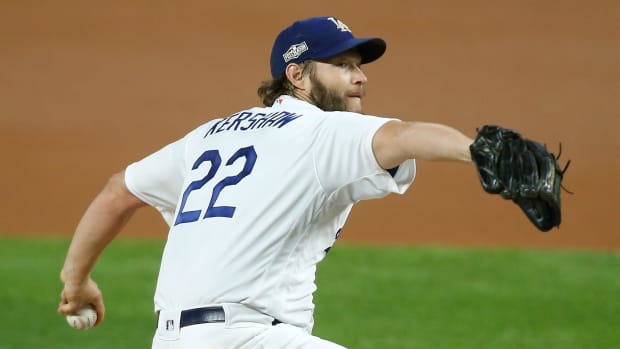Clayton Kershaw narrowly avoided failure, Cody Bellinger executed a sparkling home run robbery and Joe Kelly channeled Harry Houdini to help the Dodgers escape Game 2.
When Clayton Kershaw takes the mound for a postseason game, he’s facing two opponents: the other team’s hitters, and The Narrative.
The Narrative is well-documented: Kershaw, one of the best pitchers the game has ever seen, can’t get it done in the postseason. The premise feels illogical—of course the three-time Cy Young award winner can succeed in any environment—even though the conclusion has proven, time and time again, to be true.
Kershaw’s playoff numbers are objectively worse than the regular-season counterparts. This is not the space to hash out the reasons for that disparity—perhaps it’s the stiffer competition, smaller sample size or some indiscernible un-clutch gene—but rather an opportunity to view how The Narrative can be impacted by factors outside of Kershaw’s control through the lens of Wednesday night’s wild Game 2, in which the Dodgers hung on to a 6-5 win.
Through five innings, Kershaw was great. He allowed just four hits and one run with no walks and six strikeouts. Of the 16 balls Padres hitters put into play to that point, only six had an expected batting average over .140. Combine this 67-pitch performance with his brilliant, 13-strikeout outing against the Brewers in the wild card round, and you could sense a shift in The Narrative: Maybe this is the year everything would be different.
Then the sixth inning happened. Kershaw made two mistakes, which resulted in back-to-back homers by Manny Machado and Eric Hosmer. It made Kershaw the first pitcher to allow back-to-back home runs three times in a postseason career—the most recent coming in Game 5 of last year’s ill-fated NLDS relief appearance. As great as Kershaw had been through five innings, things felt all too familiar now.
Kershaw escaped the sixth and was pulled with the 4-3 lead still intact. At this point, the game almost immediately went off the rails.

In the seventh, Fernando Tatis Jr. missed a go-ahead, two-run homer by inches, as Cody Bellinger momentarily learned how to fly. The Dodgers added a pair of insurance runs in the bottom half of the inning, the second one coming on an RBI single by Max Muncy that had a 73.8 mph exit velocity and expected batting average of .170.
In the ninth, Kenley Jansen’s struggles continued, as he allowed three hits in five batters to make the score 6-5 with two outs. Manager Dave Roberts replaced Jansen with Joe Kelly, who walked Tatis and Machado to load the bases for Hosmer. After four tense pitches, Hosmer grounded out to second base to end the game and give Los Angeles a 2-0 series lead.
If there’s a point here in regards to Kershaw’s postseason reputation, it’s this: The Narrative, which has tormented Kershaw for basically his entire career, tonight hinged largely on events that played out after he had left the field for good. The expected batting average on Tatis’ near-dinger was .860. The ball was hit to the deepest part of the ballpark that suppressed home runs more than any other stadium in the league this season.
Muncy’s bloop hit, Roberts’s decision to trust Jansen and his flat cutter, and Kelly’s Harry Houdini act that allowed the Dodgers to escape all factored in greatly to the final outcome. Had those moments played out differently, the focus would undoubtedly have centered on Kershaw’s home run issues, or perhaps discredited his win against Milwaukee as being undeserving of consideration as a “legitimate” playoff performance (considering the quality of opponent and MLB’s expanded postseason format). The “here we go again” record would begin to spin.
Instead, Kershaw’s 2020 postseason slate remains unsullied. He’s 2-0 with 19 strikeouts, no walks and three runs allowed in 14 innings, and the Dodgers are one win from advancing to the NLCS. For one night, at least, The Narrative has been put on hold.